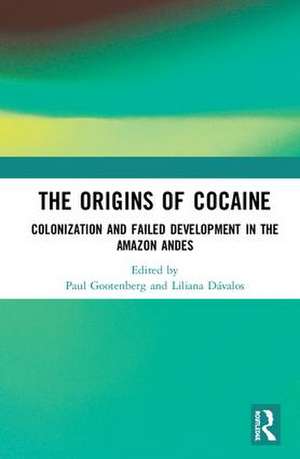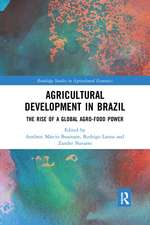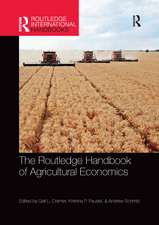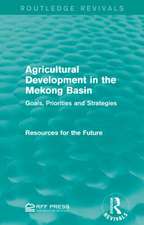The Origins of Cocaine: Colonization and Failed Development in the Amazon Andes
Editat de Paul Gootenberg, Liliana Dávalosen Limba Engleză Hardback – 27 iun 2018
| Toate formatele și edițiile | Preț | Express |
|---|---|---|
| Paperback (1) | 383.13 lei 6-8 săpt. | |
| Taylor & Francis – 10 ian 2020 | 383.13 lei 6-8 săpt. | |
| Hardback (1) | 763.11 lei 6-8 săpt. | |
| Taylor & Francis – 27 iun 2018 | 763.11 lei 6-8 săpt. |
Preț: 763.11 lei
Preț vechi: 1026.76 lei
-26% Nou
Puncte Express: 1145
Preț estimativ în valută:
146.11€ • 152.15$ • 121.23£
146.11€ • 152.15$ • 121.23£
Carte tipărită la comandă
Livrare economică 14-28 februarie
Preluare comenzi: 021 569.72.76
Specificații
ISBN-13: 9781138592223
ISBN-10: 1138592226
Pagini: 190
Ilustrații: 12
Dimensiuni: 156 x 234 x 15 mm
Greutate: 0.39 kg
Ediția:1
Editura: Taylor & Francis
Colecția Routledge
Locul publicării:Oxford, United Kingdom
ISBN-10: 1138592226
Pagini: 190
Ilustrații: 12
Dimensiuni: 156 x 234 x 15 mm
Greutate: 0.39 kg
Ediția:1
Editura: Taylor & Francis
Colecția Routledge
Locul publicării:Oxford, United Kingdom
Public țintă
PostgraduateCuprins
1. Introduction: Orphans of Development: The Unanticipated Rise of Illicit Coca in the Amazon Andes, 1950-1990 2. The Ghosts of Development Past: Deforestation and Coca in Western Amazonia 3. Ideas of Modernization and Territorial Transformation in the Rise of Coca: The Case of the Upper Huallaga Valley, Peru 4. Creating Coca Frontiers and cocaleros in Chapare: Bolivia, 1940 to 1990 5. Economic Development Policies in Colombia (1960s-1990s) and the Turn to Coca in the Andes Amazon 6. The Making of a Coca Frontier: The Case of Ariari, Colombia 7. Epilogue: Will Governments Confront Coca Cultivation, or its Causes?
Notă biografică
Paul Gootenberg is SUNY-Distinguished Professor of History and Sociology at Stony Brook University, USA, where he is also currently Chair of the History Department. He is a former chair of the Drugs, Security, and Democracy Program (DSD) of the Social Science Research Council and Open Society Foundations.
Liliana M. Dávalos is Associate Professor of Conservation Biology at Stony Brook University, USA. She has advised the United Nations Office of Drug and Crime on deforestation since 2007 and is coauthor of the 2016 World Drug Report.
Liliana M. Dávalos is Associate Professor of Conservation Biology at Stony Brook University, USA. She has advised the United Nations Office of Drug and Crime on deforestation since 2007 and is coauthor of the 2016 World Drug Report.
Recenzii
The Origins of Cocaine’s surprising conclusion turns accepted scholarly wisdom on its head: it’s been the persistent failure, not the absence, of state-led development efforts that’s pushed poor South American peasants to cultivate drug-related crops. The book proves Cold War geopolitics and ideologies of capitalist development are just as much to blame for today’s drug war chaos as northern consumers’ insatiable appetite for cocaine.
Teo Ballvé, Assistant Professor of Peace & Conflict Studies and Geography, Colgate University
What are the underlying causes of the surge in coca cultivation and the cocaine trade in the Andes? According to The Origins of Cocaine, abandoned colonization efforts to develop the Amazon are the key. A must-read for academics and policy makers alike, this timely and cutting-edge research provides important evidence for rethinking failed strategies to reduce the supply of cocaine, and instead promote long-term, equitable and environmentally sustainable development in some of the Andes’ poorest regions.
Coletta A. Youngers, Senior Fellow, The Washington Office on Latin America (WOLA), Co-editor, Drugs and Democracy in Latin America, United States
The Origins of Cocaineprovides a timely and fascinating account of the expansion of coca and cocaine production in the Andes Amazon. It asks, why have Peru, Colombia and Bolivia ended up with remarkably similar illicit frontier economies? By weaving together interdisciplinary debates, innovative methodological approaches, and comparative data, the book explores this question through a culturally and historically sensitive framework. A must read for anyone interested in drug crop cultivation, cocaine production and the unintended consequences of development.
Dr Thomas Grisaffi, Lecturer, Geography and Environmental Science, The University of Reading, United Kingdom
Teo Ballvé, Assistant Professor of Peace & Conflict Studies and Geography, Colgate University
What are the underlying causes of the surge in coca cultivation and the cocaine trade in the Andes? According to The Origins of Cocaine, abandoned colonization efforts to develop the Amazon are the key. A must-read for academics and policy makers alike, this timely and cutting-edge research provides important evidence for rethinking failed strategies to reduce the supply of cocaine, and instead promote long-term, equitable and environmentally sustainable development in some of the Andes’ poorest regions.
Coletta A. Youngers, Senior Fellow, The Washington Office on Latin America (WOLA), Co-editor, Drugs and Democracy in Latin America, United States
The Origins of Cocaineprovides a timely and fascinating account of the expansion of coca and cocaine production in the Andes Amazon. It asks, why have Peru, Colombia and Bolivia ended up with remarkably similar illicit frontier economies? By weaving together interdisciplinary debates, innovative methodological approaches, and comparative data, the book explores this question through a culturally and historically sensitive framework. A must read for anyone interested in drug crop cultivation, cocaine production and the unintended consequences of development.
Dr Thomas Grisaffi, Lecturer, Geography and Environmental Science, The University of Reading, United Kingdom
Descriere
Drawing on concepts from both history and anthropology, The Origins of Cocaine explores how three countries - Colombia, Peru, and Bolivia - with divergent different mid-century political trajectories ended up with parallel outcomes in illicit frontier economies and cocalero cultures.



